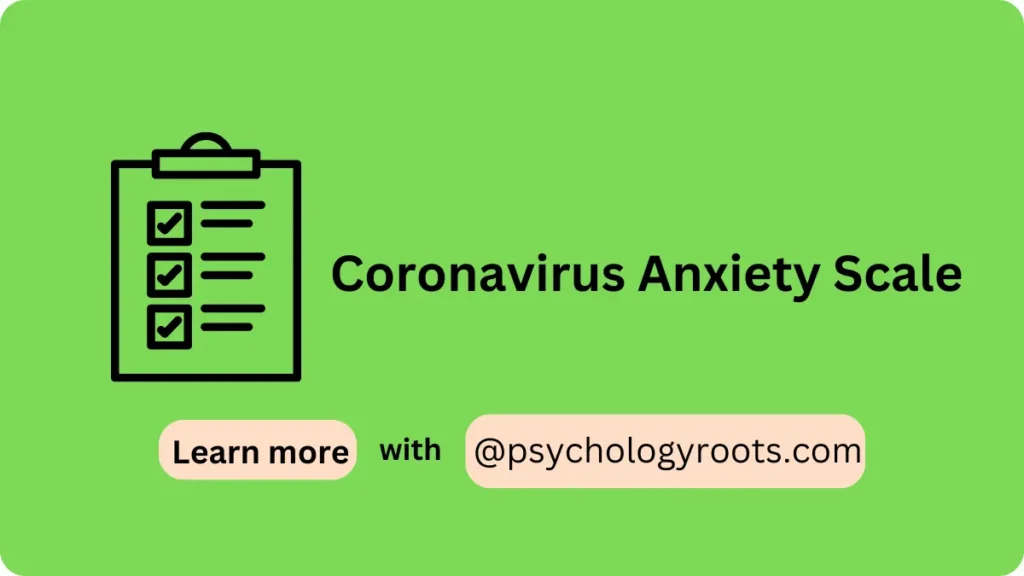Table of Contents
Coronavirus Anxiety Scale
Here in this post, we are sharing the “Coronavirus Anxiety Scale”. You can read psychometric and Author information. We have thousands of Scales and questionnaires in our collection (See Scales and Questionnaires). You can demand us any scale and questionnaires related to psychology through our community, and we will provide you with a short time. Keep visiting Psychology Roots.
About Coronavirus Anxiety Scale
Scale Name
Coronavirus Anxiety Scale
Author Details
Sherman A. Lee
Translation Availability
Not Sure

Background/Description
The Coronavirus Anxiety Scale (CAS) is a brief mental health screener designed to identify individuals experiencing significant anxiety related to the COVID-19 pandemic. Developed by Sherman A. Lee in 2020, the CAS was created in response to the global rise in anxiety due to the unprecedented challenges posed by the pandemic, including fears of infection, social isolation, and uncertainty about the future.
The CAS is a short, self-report tool that focuses specifically on the anxiety symptoms associated with the coronavirus, including dizziness, sleep disturbances, tonic immobility, appetite loss, and nausea. These symptoms are measured over the past two weeks, capturing both the psychological and somatic manifestations of COVID-19-related anxiety. The scale provides a quick and effective way to identify individuals who may be at risk for developing more severe mental health issues, allowing for timely intervention.
The CAS is widely used in both clinical practice and research to screen for coronavirus-related anxiety, particularly in settings where time and resources are limited. It is suitable for use with adults and can be administered in various formats, including online and in-person.
Administration, Scoring and Interpretation
- Participant Selection: The CAS is designed for adults who may be experiencing anxiety related to the COVID-19 pandemic. It is appropriate for use in clinical settings, public health surveys, and research studies.
- Questionnaire Distribution: The CAS is administered as a self-report questionnaire. Participants are asked to reflect on their experiences over the past two weeks and rate the frequency of anxiety symptoms on a 5-point Likert scale.
- Response Format: The response options range from 0 (not at all) to 4 (nearly every day), indicating how often they have experienced each symptom.
- Scoring: The CAS consists of five items, and the total score is obtained by summing the responses to all items. A higher score indicates a greater level of anxiety related to the coronavirus.
Reliability and Validity
The Coronavirus Anxiety Scale has demonstrated strong psychometric properties. It has shown high internal consistency, with Cronbach’s alpha values typically above 0.90. The scale’s validity is supported by its ability to distinguish between individuals with high and low levels of coronavirus-related anxiety and its correlation with other measures of anxiety and stress.
The CAS has been validated across different populations and has proven to be a reliable tool for screening COVID-19-related anxiety, making it an essential resource for mental health professionals during the pandemic.
Available Versions
05-Items
Reference
Lee, S. A. (2020). Coronavirus Anxiety Scale: A brief mental health screener for COVID-19 related anxiety. Death studies, 44(7), 393-401.
Important Link
Scale File:
Frequently Asked Questions
Q: What is the Coronavirus Anxiety Scale (CAS)?
A: The CAS is a brief mental health screener designed to assess anxiety related to the COVID-19 pandemic, focusing on both psychological and somatic symptoms.
Q: Who developed the CAS?
A: The CAS was developed by Sherman A. Lee in 2020 in response to the rise in anxiety during the COVID-19 pandemic.
Q: How is the CAS administered?
A: The CAS is administered as a self-report questionnaire, where participants rate the frequency of specific anxiety symptoms over the past two weeks.
Q: What are the key symptoms measured by the CAS?
A: The CAS measures symptoms such as dizziness, sleep disturbances, tonic immobility, appetite loss, and nausea, all of which are associated with COVID-19-related anxiety.
Q: How reliable is the CAS?
A: The CAS has shown high reliability and validity, making it a trusted tool for screening anxiety during the COVID-19 pandemic.
Disclaimer
Please note that Psychology Roots does not have the right to grant permission for the use of any psychological scales or assessments listed on its website. To use any scale or assessment, you must obtain permission directly from the author or translator of the tool. Psychology Roots provides information about various tools and their administration procedures, but it is your responsibility to obtain proper permissions before using any scale or assessment. If you need further information about an author’s contact details, please submit a query to the Psychology Roots team.
Help Us Improve This Article
Have you discovered an inaccuracy? We put out great effort to give accurate and scientifically trustworthy information to our readers. Please notify us if you discover any typographical or grammatical errors.
Make a comment. We acknowledge and appreciate your efforts.
Share With Us
If you have any scale or any material related to psychology kindly share it with us at psychologyroots@gmail.com. We help others on behalf of you.